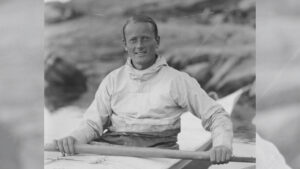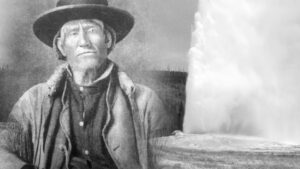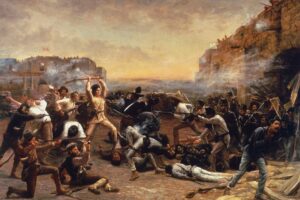As the “Uncrowned Queen of Mesopotamia”, Gertrude Bell gave up a life of luxury to help reshape the Middle East after the collapse of the Ottoman Empire in the early 20th century.
Background and education
Gertrude Bell was born into a wealthy political family in the UK’s County Durham in 1868. From a young age, her father and stepmother instilled in her a love for the arts, history, and politics. Her uncle was Sir Frank Lascelles, a famous British diplomat who served in Russia, Germany, Egypt, Spain, Bulgaria, Romania, Greece, and Persia. Bell became fascinated with Persia in particular and exploring in general after visiting him there.

Gertrude Bell in Iraq. Photo: Public Domain
She had a great love for the outdoors, climbing, and horseback riding. She took her curiosities further by studying modern history at Oxford. Bell became the first woman in the University’s history to graduate with first-class honors. A gifted linguist, she taught herself Persian, French, German, Arabic, Turkish, and Italian, and was fluent in most of them. Contemporaries described her as outspoken, proficient in the art of debating, and someone who loved to challenge authority.
Despite these impressive accomplishments, her peers and society as a whole did not approve of her choice of life path. She remained single her whole life and had no children. Rather, she chose to spend her days constantly learning and on the road. A rival of hers, Sir Mark Sykes, snidely called her a “silly chattering windbag” and a “man-woman.”
Travels
Even though mountaineering was not what she was recognized for, she achieved milestones on some of the world’s most iconic mountains. Starting in 1899, she made 10 ascents in the Alps, including summiting Mont Blanc, the Matterhorn, La Meije, and the peak Gertrudspitze, named after her. She spent time in the Rockies as well. When she climbed, she often went in her underclothes or pants. The danger she intermittently found herself in did not seem to deter her.
After graduation, she traveled extensively with her brother Maurice to the United States, Mexico, Germany, Italy, Greece, Turkey, Egypt, Japan, and China. She eventually began a love affair with the Middle East.
From the late 1800s to the early 1900s, Bell traversed the deserts and ancient sites of Mesopotamia, Babylon, Arabia, Egypt, the Levant, and Asia Minor. She helped conduct groundbreaking archaeological excavations in the region. She was also the second woman ever to visit the city of Ha’il in Saudi Arabia, a place at the crossroads of frequent wars and dynastic disputes. Bell authored many books about her travels, including Persian Pictures (1894), Syria: The Desert and the Sown (1907), The Thousand and One Churches (1907) and Amurath to Amurath (1911).

Photo: Newcastle University/Gertrude Bell Archive
Her keen interest in tribal culture prompted her to form lasting friendships with their leaders. This played a significant role in the next phase of her career as a diplomatic liaison. Bell also struck up a friendship with none other than T.E Lawrence — Lawrence of Arabia.
Nation building
Bell viewed the decline of Ottoman rule as an opportunity for new borders to be drawn and new countries to emerge. She worked for the Red Cross, but her expertise with local languages and tribal cultures made her an asset to the British government.
She joined the Arab Bureau, an intelligence agency that sought to release pro-British propaganda throughout the Middle East to counteract the anti-British propaganda of Germany and Turkey. Later, she served as an intelligence officer in Egypt.
Even though Bell was a tool for pushing British interests in the region, she was, like T.E. Lawrence, a firm believer in Arab self-determination and nationalism. She tried her best to promote solutions that suited both parties. Bell particularly championed the cause of a sovereign Iraqi state.
This led to her famous report called “Self Determination in Mesopotamia.” It outlined recommendations for borders and government structures. In 1917, she became Oriental Secretary and was an official at the Cairo Conference in 1921.
Eventually, the British installed King Faisal on the throne of the fledgling kingdom of Iraq. The king took Bell’s counsel in most matters, especially concerning the governance of the tribes. Bell earned a reputation as a king-maker for her close ties to the Iraqi crown.

Gertrude Bell at a dig. Photo: Newcastle University/Gertrude Bell Archive
However, political matters eventually bored her and seemed to wear her down. She was granted the resources to establish the Iraq Museum, which collected and protected much of the nation’s cultural heritage. It prevented the looting of vital artifacts for the black market.
Legacy
She lived out her days in her beloved Baghdad. Sadly, the twilight of her life was tainted by depression, chronic illness, and personal tragedies. She died from a potential overdose of sleeping pills in 1926.
In her obituary, her colleague and fellow Arabist Harry St John Philby praised her versatility, knowledge, and “practical idealism tempered with honest opportunism.” Academic Paul Collins refers to her as “a controversial figure, especially in the context of the founding of the modern State of Iraq.”
Some criticize her split allegiances between Arabs and the British. However, we cannot deny the hard work she put in to help shape the Middle East after World War I.






